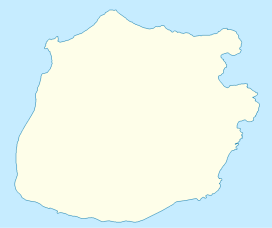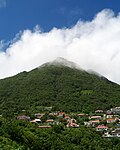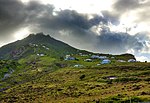Mount Scenery: Difference between revisions
No edit summary |
No edit summary |
||
| Line 29: | Line 29: | ||
The Saba volcano is potentially dangerous. It is currently classified as "dormant", which means it is an active volcano that is not erupting now, but could erupt in the future.<ref>{{Cite web |title=Active, dormant, and extinct: Clarifying confusing classifications {{!}} U.S. Geological Survey |url=https://www.usgs.gov/observatories/yvo/news/active-dormant-and-extinct-clarifying-confusing-classifications#:~:text=Volcanologists%20use%20that%20term%20as,volcano%20that%20is%20currently%20erupting |access-date=2024-02-08 |website=www.usgs.gov}}</ref> The last eruption was in or around the year 1640<ref name=":4" /> which included explosions and [[pyroclastic flows]]. The most recent major eruption was at least 5,000 years ago.<ref>{{Cite web |date=2018-06-21 |title=About Saba |url=https://www.sabatourism.com/about-saba/ |access-date=2024-02-07 |website=Saba Tourism |language=en-US}}</ref> According to the U.S. [[Global Volcanism Program]], Saba's volcano is the northernmost active volcano in the Caribbean.<ref name=":4" /> |
The Saba volcano is potentially dangerous. It is currently classified as "dormant", which means it is an active volcano that is not erupting now, but could erupt in the future.<ref>{{Cite web |title=Active, dormant, and extinct: Clarifying confusing classifications {{!}} U.S. Geological Survey |url=https://www.usgs.gov/observatories/yvo/news/active-dormant-and-extinct-clarifying-confusing-classifications#:~:text=Volcanologists%20use%20that%20term%20as,volcano%20that%20is%20currently%20erupting |access-date=2024-02-08 |website=www.usgs.gov}}</ref> The last eruption was in or around the year 1640<ref name=":4" /> which included explosions and [[pyroclastic flows]]. The most recent major eruption was at least 5,000 years ago.<ref>{{Cite web |date=2018-06-21 |title=About Saba |url=https://www.sabatourism.com/about-saba/ |access-date=2024-02-07 |website=Saba Tourism |language=en-US}}</ref> According to the U.S. [[Global Volcanism Program]], Saba's volcano is the northernmost active volcano in the Caribbean.<ref name=":4" /> |
||
On 2 September 2019, Mount Scenery Nature Park was elevated to the status of national park.<ref>{{cite web |url=http://www.saba-news.com/national-park-status-for-mount-scenery-nature-park/ |title=National park status for Mount Scenery Nature Park - Saba News |website=www.saba-news.com |url-status=dead |archive-url=https://web.archive.org/web/20190907001050/http://www.saba-news.com/national-park-status-for-mount-scenery-nature-park/ |archive-date=2019-09-07}}</ref> It has a hiking trail to |
On 2 September 2019, Mount Scenery Nature Park was elevated to the status of national park.<ref>{{cite web |url=http://www.saba-news.com/national-park-status-for-mount-scenery-nature-park/ |title=National park status for Mount Scenery Nature Park - Saba News |website=www.saba-news.com |url-status=dead |archive-url=https://web.archive.org/web/20190907001050/http://www.saba-news.com/national-park-status-for-mount-scenery-nature-park/ |archive-date=2019-09-07}}</ref> It has a hiking trail to the summit of the volcano, which is one of Saba's biggest tourist attractions. Along the way up the mountain are the multiple climate zones of Saba, including a [[cloud forest]] at the summit.<ref name=":3" /><ref name=":2" /> |
||
== History == |
== History == |
||
| Line 35: | Line 35: | ||
Volcanic activity on Saba occurred up to the mid-17th century, just before [[Saba (island)#History|European settlement on the island]].<ref name=":02" /> Some of this activity may have occurred while [[Indigenous peoples of the Americas|Amerindians]] were living on the island, as it is believed that Amerindians inhabited the island (at least periodically) for approximately 2,500 years before Europeans arrived.<ref name=":02" /> |
Volcanic activity on Saba occurred up to the mid-17th century, just before [[Saba (island)#History|European settlement on the island]].<ref name=":02" /> Some of this activity may have occurred while [[Indigenous peoples of the Americas|Amerindians]] were living on the island, as it is believed that Amerindians inhabited the island (at least periodically) for approximately 2,500 years before Europeans arrived.<ref name=":02" /> |
||
[[File:Collectie Nationaal Museum van Wereldculturen TM-10021156 Stadsgezicht, gelegen in een vallei met op de achtergrond een berg gezien vanaf een bergtop Saba -Nederlandse Antillen fotograaf niet bekend.jpg|thumb|Farming plots on the slopes of Mt. Scenery, above Windwardside village ( |
[[File:Collectie Nationaal Museum van Wereldculturen TM-10021156 Stadsgezicht, gelegen in een vallei met op de achtergrond een berg gezien vanaf een bergtop Saba -Nederlandse Antillen fotograaf niet bekend.jpg|thumb|Farming plots on the slopes of Mt. Scenery, above Windwardside village (in 1909 or 1910)]] |
||
[[File:Collectie NMvWereldculturen, TM-10028908, glasnegatief 'Bananen oogst op Saba', fotograaf niet bekend, 1910-1940.jpg|thumb|Banana harvesting on Saba (between 1910 and 1940)]] |
[[File:Collectie NMvWereldculturen, TM-10028908, glasnegatief 'Bananen oogst op Saba', fotograaf niet bekend, 1910-1940.jpg|thumb|Banana harvesting on Saba (between 1910 and 1940)]] |
||
During the early years of European settlement, Mount Scenery (known locally as "The Mountain" through the mid-20th century) was an important location for farming,<ref name=":22">{{Cite journal |last=Price |first=A. Grenfell |date=1934 |title=White Settlement in Saba Island, Dutch West Indies |url=https://www.jstor.org/stable/209493 |journal=Geographical Review |volume=24 |issue=1 |pages=42–60 |doi=10.2307/209493 |jstor=209493 |bibcode=1934GeoRv..24...42P |issn=0016-7428}}</ref> and through the late 19th and early 20th century, the majority of Saban families were dependent upon "farming The Mountain" or fishing.<ref name=":12">{{Cite web |date=2019-08-28 |title=The Mountain |url=https://thesabaislander.com/2019/08/28/the-mountain/ |access-date=2024-02-08 |website=The Saba Islander |language=en}}</ref><ref name=":2">{{Cite book |last=Crane |first=Julia G. |url=https://books.google.com/books?id=vip7AAAAMAAJ |title=Educated to Emigrate: The Social Organization of Saba |date=1971 |publisher=Round the World Publishing |isbn=978-90-232-0702-3 |language=en}}</ref> Common foodstuffs farmed included [[banana]]s, [[Potato|white potatoes]], [[sweet potato]]es, [[Xanthosoma|tannias]], [[cabbage]], [[pumpkin]]s, and [[onion]]s.<ref name=":2" /> Farmers from the village of [[Windwardside]] farmed an area of The Mountain called "Big Rendez-Vous", and farmers from the village of [[St. Johns, Saba|St. Johns]] farmed an area called "Little Rendez-Vous".<ref name=":12" /> Today, most of the farmland on Mount Scenery is gone; although ruins of old farmland are visible on some of Saba's hiking trails.<ref>{{Cite web |date=2022-03-10 |title=Hiking {{!}} Saba Tourism |url=https://www.sabatourism.com/hiking/ |access-date=2024-02-08 |language=en-US}}</ref> |
During the early years of European settlement, Mount Scenery (known locally as "The Mountain" through the mid-20th century) was an important location for farming,<ref name=":22">{{Cite journal |last=Price |first=A. Grenfell |date=1934 |title=White Settlement in Saba Island, Dutch West Indies |url=https://www.jstor.org/stable/209493 |journal=Geographical Review |volume=24 |issue=1 |pages=42–60 |doi=10.2307/209493 |jstor=209493 |bibcode=1934GeoRv..24...42P |issn=0016-7428}}</ref> and through the late 19th and early 20th century, the majority of Saban families were dependent upon "farming The Mountain" or fishing.<ref name=":12">{{Cite web |date=2019-08-28 |title=The Mountain |url=https://thesabaislander.com/2019/08/28/the-mountain/ |access-date=2024-02-08 |website=The Saba Islander |language=en}}</ref><ref name=":2">{{Cite book |last=Crane |first=Julia G. |url=https://books.google.com/books?id=vip7AAAAMAAJ |title=Educated to Emigrate: The Social Organization of Saba |date=1971 |publisher=Round the World Publishing |isbn=978-90-232-0702-3 |language=en}}</ref> Common foodstuffs farmed included [[banana]]s, [[Potato|white potatoes]], [[sweet potato]]es, [[Xanthosoma|tannias]], [[cabbage]], [[pumpkin]]s, and [[onion]]s.<ref name=":2" /> Farmers from the village of [[Windwardside]] farmed an area of The Mountain called "Big Rendez-Vous", and farmers from the village of [[St. Johns, Saba|St. Johns]] farmed an area called "Little Rendez-Vous".<ref name=":12" /> Today, most of the farmland on Mount Scenery is gone; although ruins of old farmland are visible on some of Saba's hiking trails.<ref>{{Cite web |date=2022-03-10 |title=Hiking {{!}} Saba Tourism |url=https://www.sabatourism.com/hiking/ |access-date=2024-02-08 |language=en-US}}</ref> |
||
Revision as of 09:51, 15 September 2024
| Mount Scenery | |
|---|---|
 Saba with Mount Scenery's peak in the clouds | |
| Highest point | |
| Elevation | 887 m (2,910 ft) |
| Prominence | 887 m (2,910 ft) |
| Listing | Country high point |
| Coordinates | 17°38′06″N 63°14′21″W / 17.63500°N 63.23917°W |
| Geography | |
| Location | Saba, Caribbean Netherlands |
| Geology | |
| Mountain type | Stratovolcano with lava dome |
| Volcanic arc | Lesser Antilles Volcanic Arc |
| Last eruption | 1640 |
Mount Scenery is a dormant volcano in the Caribbean Netherlands. Its lava dome forms the summit of the Saba island stratovolcano. At an elevation of 887 m (2,910 ft),[1] it is the highest point in both the Kingdom of the Netherlands, and, since the dissolution of the Netherlands Antilles on 10 October 2010, the highest point in the Netherlands proper.
The Saba volcano is potentially dangerous. It is currently classified as "dormant", which means it is an active volcano that is not erupting now, but could erupt in the future.[2] The last eruption was in or around the year 1640[1] which included explosions and pyroclastic flows. The most recent major eruption was at least 5,000 years ago.[3] According to the U.S. Global Volcanism Program, Saba's volcano is the northernmost active volcano in the Caribbean.[1]
On 2 September 2019, Mount Scenery Nature Park was elevated to the status of national park.[4] It has a hiking trail to the summit of the volcano, which is one of Saba's biggest tourist attractions. Along the way up the mountain are the multiple climate zones of Saba, including a cloud forest at the summit.[5][6]
History
The formation of Mount Scenery began about 500,000 years ago, when the subaerial part of Saba began forming.[7] About 100,000 years ago, another phase of volcanic activity created the hills that surround The Bottom.[7] It was likely during this time that Mount Scenery's lava dome summit formed.[8] The last major eruption happened about 5,000 years ago, during the Holocene era. The volcano was plugged by a massive basalt rock, which is why there is no typical volcanic crater at Mount Scenery's summit.[7]
Volcanic activity on Saba occurred up to the mid-17th century, just before European settlement on the island.[7] Some of this activity may have occurred while Amerindians were living on the island, as it is believed that Amerindians inhabited the island (at least periodically) for approximately 2,500 years before Europeans arrived.[7]


During the early years of European settlement, Mount Scenery (known locally as "The Mountain" through the mid-20th century) was an important location for farming,[9] and through the late 19th and early 20th century, the majority of Saban families were dependent upon "farming The Mountain" or fishing.[10][6] Common foodstuffs farmed included bananas, white potatoes, sweet potatoes, tannias, cabbage, pumpkins, and onions.[6] Farmers from the village of Windwardside farmed an area of The Mountain called "Big Rendez-Vous", and farmers from the village of St. Johns farmed an area called "Little Rendez-Vous".[10] Today, most of the farmland on Mount Scenery is gone; although ruins of old farmland are visible on some of Saba's hiking trails.[11]
In the late 1960s, a stone stairway was built from Windwardside to the summit of Mount Scenery, consisting of 1,064 steps.[12][13][14] The stairway was built by hand, step by step, by local Sabans.[13] Today the stairway is known as the Mount Scenery Trail, and is a popular hiking trail.[15][16][17]
In 2018, Mount Scenery Nature Park was established.[18][19] The park covers an area of approximately 3.42 square kilometres (1.32 sq mi), which is about 26% of Saba's total area.[19] The park supports eco-tourism, maintains the trail system, protects biodiversity, and preserves historical structures.[19] In 2019, the park was elevated to the status of national park, and is now called Mount Scenery National Park.[18]
Volcanic monitoring
Scientific monitoring of Mount Scenery's volcanic activity began in the 1970s. From 1978 to 1983, the Lamont–Doherty Geological Observatory monitored Saba's seismic activity.[7][20] Between 1992 and 2004, the Seismic Research Center in Trinidad operated a seismometer on Mount Scenery's summit.
In 2006, the Royal Netherlands Meteorological Institute (KNMI) began monitoring seismic activity related to Mount Scenery.[20] As of 2018, the KNMI had four seismic monitoring stations on Saba.[20] In 2022, the KNMI installed four cost-effective GNSS units Saba, one of which is located at the top of Mount Scenery. The units are solar-powered, and were installed as part of a pilot study to assess the suitability of cost-effective GNSS use for monitoring volcanic activity.[21][22]
Hiking

Mount Scenery Trail
The Mount Scenery Trail is Saba's most popular hiking trail.[15][16][17] The trail is a strenuous out-and-back trail, which goes up 1064 steps to Mt. Scenery's summit and back.[23] It takes about 90 minutes each way.[24]
The main trailhead for Mt. Scenery Trail is located on the road just outside Windwardside, across from the Trail Shop.[25] There are two alternative accesses to the trail: one from the end of the Mountain Road, which reduces the hike by about 25 minutes;[23] and one from the Bud's Mountain Trail, which joins the Mt. Scenery trail at the highest shelter.[23] At the top of the trail, there are three different viewpoints of the island.[26]
The lower portion of the trail goes through rainforest and secondary rainforest.[27] Here hikers can see tree ferns, Elephant Ears (Taro), wild plantains (Heliconia), Mountain Palm (Euterpe precatoria), and "Mountain Manna" (Begonia retusa).[27][28] The upper 50 metres (160 ft) of the trail is a cloud forest called the Elfin Forest.[5][28] Here hikers can see Mountain Mahogany,[29][5] as well as orchids, liverworts, mosses, ferns, and other epiphytes.[28][5]
The Elfin Trail
The Elfin Trail is Saba's newest hiking trail, established in 2018.[30] The trail begins on the Sandy Cruz Trail, and ends when it intersects with the Mount Scenery Trail.[31] The hike takes about 1 hour one-way.[31]
The trail follows the old paths used by farmers of earlier generations.[30] Hikers of the trail will go through three ecosystems: woodlands, rainforest, cloud forest.[30] Hikers can see Elephant Ears (Taro), Mountain Fuchsia, Maxillaria Orchids, large Banana trees, and other flora.[31] The trail also provides views of Old Booby Hill, Cove Bay, and the airport.[31]
Communications technology

In 1972, British Cable & Wireless began construction of a microwave relay station at the top of Mount Scenery.[12][32] The purpose of the microwave relay was to link the islands of Antigua and Tortolla via Saba.[12] Though no longer in operation, the relay station and tower still sit at the top of Mount Scenery today.[13]
JRCC Curaçao (the Dutch Caribbean Coast Guard Joint Rescue Coordination Center at Curaçao),[33] has one of its emergency monitoring stations located on Mount Scenery.[34] The station, "DSC Station Mt. Scenery",[34] is a Digital Selective Calling (DSC) station, meaning that it has "equipment that allows mariners to instantly send or receive automatically formatted distress alerts to vessels and coast stations in the area."[35] DSC Station Mt. Scenery provides 24-hour monitoring with a range of 70 nautical miles (130 km; 81 mi).[34][36]
On the lower slopes of Mount Scenery in the village of St. Johns, the St. John's Lighthouse was constructed. The navigational aid is a 15 metres (49 ft) high tower mounted to a 1-story white concrete base.[37] Its light emits two white flashes every 10 seconds.[37]
Gallery
-
Mount Scenery in the clouds, as seen from Windwardside
-
Mount Scenery as seen from Windwardside
-
Mount Scenery as seen from Lower Hell's Gate
-
One of the Mount Scenery trailheads
-
Mount Scenery Trail steps
-
Saba anole on an Elephant ear, on the Mount Scenery Trail
-
Marcgravia umbellata on the Mount Scenery Trail
-
Creeping Charlie on the Mount Scenery Trail
See also
- List of volcanoes in the Netherlands
- Vaalserberg - the highest point in the Netherlands in Europe
References
- ^ a b c "Saba". Global Volcanism Program. Smithsonian Institution. Retrieved 30 August 2020.
- ^ "Active, dormant, and extinct: Clarifying confusing classifications | U.S. Geological Survey". www.usgs.gov. Retrieved 2024-02-08.
- ^ "About Saba". Saba Tourism. 2018-06-21. Retrieved 2024-02-07.
- ^ "National park status for Mount Scenery Nature Park - Saba News". www.saba-news.com. Archived from the original on 2019-09-07.
- ^ a b c d "Hiking: The Summit of Mt. Scenery". Saba Tourism. 2022-03-10. Retrieved 2024-02-07.
- ^ a b c Crane, Julia G. (1971). Educated to Emigrate: The Social Organization of Saba. Round the World Publishing. ISBN 978-90-232-0702-3.
- ^ a b c d e f Roobol, M. John (2004). Volcanology of Saba and St. Eustatius, Northern Lesser Antilles: Textbd. Koninklijke Nederlandse Akademie van Wetenschappen.
- ^ "Saba". Global Volcanism Program. Smithsonian Institution. Retrieved 30 August 2020.
- ^ Price, A. Grenfell (1934). "White Settlement in Saba Island, Dutch West Indies". Geographical Review. 24 (1): 42–60. Bibcode:1934GeoRv..24...42P. doi:10.2307/209493. ISSN 0016-7428. JSTOR 209493.
- ^ a b "The Mountain". The Saba Islander. 2019-08-28. Retrieved 2024-02-08.
- ^ "Hiking | Saba Tourism". 2022-03-10. Retrieved 2024-02-08.
- ^ a b c Hartog, Johannes (1975). History of Saba. Netherlands Antilles: Saba Artisan Foundation.
- ^ a b c Greaves-Gabbadon, Sarah (2015-08-28). "Hiking Saba's Mount Scenery". Caribbean Journal. Retrieved 2024-02-09.
- ^ "The Chronological History of Saba". The Saba Islander. 2021-02-06. Retrieved 2024-02-10.
- ^ a b "Hiking on Saba | Sea Saba Dive Center". seasaba. Retrieved 2024-01-15.
- ^ a b Greaves-Gabbadon, Sarah (March 27, 2013). "This 5-square-mile Island Has a 'Disappearing Beach' — and It's Called the 'Unspoiled Queen of the Caribbean'". Travel + Leisure.
- ^ a b Werner, Laurie. "Ultimate Caribbean Seclusion: The Under The Radar, Newly Reopened Island Of Saba". Forbes. Retrieved 2024-01-15.
- ^ a b "National park status for Mount Scenery Nature Park". BES Reporter. Sep 4, 2019.
- ^ a b c "Mount Scenery National Park". Saba Conservation Foundation. Retrieved 2024-02-08.
- ^ a b c De Zeeuw-van Dalfsen, Elske; Sleeman, Reinoud (2018). "A Permanent, Real-Time Monitoring Network for the Volcanoes Mount Scenery and The Quill in the Caribbean Netherlands". Geosciences. 8 (9): 320. Bibcode:2018Geosc...8..320D. doi:10.3390/geosciences8090320. ISSN 2076-3263.
- ^ de Zeeuw-van Dalfsen, Elske (2023). Volcano Monitoring Updates Saba and St. Eustatius 2017 - 2023 (PDF) (Report). Royal Netherlands Meteorological Institute.
- ^ "Seismic and Volcano Monitoring Team on Saba". Saba News. 2023-11-08. Retrieved 2024-02-10.
- ^ a b c "Plan your Hike". Saba Conservation Foundation. Retrieved 2024-02-07.
- ^ "Mt. Scenery | Saba Tourism". 2022-03-14. Retrieved 2024-01-15.
- ^ "The Trail Shop | Saba Tourism". 2018-06-22. Retrieved 2024-01-15.
- ^ "Hiking: Mt. Scenery". Saba Tourism. 2022-03-10. Retrieved 2024-02-07.
- ^ a b "Hiking: Lower Slopes". Saba Tourism. 2022-03-10. Retrieved 2024-02-07.
- ^ a b c "Hiking Trails: Flora and Fauna". www.sabapark.org. Saba Conservation Foundation. Retrieved 2024-02-07.
- ^ "Species Action Plan: Mountain mahogany" (PDF). Dutch Caribbean Biodiversity Database. 2020.
- ^ a b c Staff, Caribbean Journal (2018-08-20). "A New Hiking Trail in Saba". Caribbean Journal. Retrieved 2024-02-08.
- ^ a b c d "Plan your Hike". Saba Conservation Foundation. Retrieved 2024-02-08.
- ^ MacRae, D.R.; De Meyer, K. (July 2018). Mount Scenery Nature Park Management Plan (PDF) (Report).
- ^ "The Dutch Caribbean Coast Guard (DCCG)". www.sintmaartengov.org. Retrieved 2024-02-10.
- ^ a b c "Chapter 4: Distress, Emergency, and Safety Traffic". Radio Navigational Aids (PDF). Vol. 117. Springfield, VA: National Geospatial-Intelligence Agency. 2014. p. 81.
- ^ "Chapter 3: Radio Navigational Warnings". Radio Navigational Aids (PDF). Vol. 117. Springfield, VA: National Geospatial-Intelligence Agency. 2014. p. 3.
- ^ Master Plan of Shore-Based Facilities for the Global Maritime Distress and Safety System (PDF) (Report). International Maritime Organization. 30 July 2018.
- ^ a b "Lighthouses of Saba and Sint Eustatius". www.ibiblio.org. Retrieved 2024-01-24.










